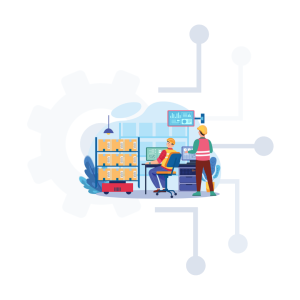Introduction to Communication Protocols
In the intricate world of Electronic Data Interchange (EDI), efficient data transmission is paramount. Several communication protocols vie for prominence, each with its strengths and applications. Let’s explore four key communication protocols—FTP, FTPS, sFTP, and AS2—providing insights into their unique features, how EDI is employed within each, and a comprehensive comparison to guide businesses in making informed decisions.
Key Takeaways
Importance of Communication Protocols in EDI: Communication protocols serve as the foundation for transmitting EDI data between trading partners, ensuring that business information is exchanged securely and reliably.
Common Communication Protocols: The blog discusses several widely used EDI communication protocols, including:
- AS2 (Applicability Statement 2): A popular protocol for securely transmitting EDI documents over the internet.
- FTP (File Transfer Protocol): Used for transferring large files but lacks built-in security features.
- SFTP (Secure File Transfer Protocol): An improved version of FTP with added encryption and security.
- OFTP (ODETTE File Transfer Protocol): Primarily used in the automotive industry for exchanging documents.
- Web Services: A modern protocol that allows real-time, on-demand data exchanges between systems.
Factors to Consider When Choosing a Protocol: Businesses should evaluate factors such as security requirements, industry standards, cost, and compatibility with trading partners before selecting a communication protocol.
Role of Security in EDI Communication: Security is a critical element of EDI communication, and protocols like AS2 and SFTP offer encryption and secure authentication to protect sensitive business data.
Customization and Flexibility: Many protocols allow for customization to meet the specific needs of different industries and trading partners, offering flexibility in implementation.
Commport’s Expertise: Commport provides solutions that support various communication protocols, ensuring seamless, secure, and efficient data transmission for businesses of all sizes.
Understanding FTP, FTPS, sFTP, and AS2
FTP (File Transfer Protocol)
FTP, the File Transfer Protocol, has long been a stalwart in data transmission. It operates over a standard network, allowing the transfer of files between a client and a server. While widely used, FTP has its limitations in terms of security as it transmits data in plaintext.
FTP serves as a basic platform for EDI transactions. However, due to its lack of built-in security, businesses often deploy additional security measures or migrate to more secure alternatives for
FTPS (FTP Secure)
FTPS is an extension of FTP that addresses its security shortcomings. It employs Transport Layer Security (TLS) or Secure Sockets Layer (SSL) encryption to secure the data transfer process. FTPS provides a secure alternative for businesses that demand heightened data protection.
FTPS enhances FTP by adding a layer of encryption, making it a more secure option for EDI data transmission. It ensures the confidentiality and integrity of the exchanged data, meeting the stringent security requirements of EDI.
sFTP (Secure File Transfer Protocol)
sFTP is a distinct protocol often confused with FTPS due to its similar name. It operates over the Secure Shell (SSH) protocol, providing a secure and encrypted channel for file transfer. sFTP is known for its robust security measures.
sFTP, operating over an encrypted SSH channel, provides a secure environment for EDI transactions. It is particularly favored when data security is a top priority, offering a robust solution for sensitive EDI exchanges.
AS2 (Applicability Statement 2)
AS2, part of the EDI landscape, defines how to securely transport data over the internet using HTTP or HTTPS. It establishes a point-to-point connection, ensuring secure and reliable data exchange, making it a popular choice for EDI transactions.
AS2 is specifically designed for EDI transactions over the Internet. It leverages HTTP or HTTPS protocols, ensuring data integrity, non-repudiation, and secure communication between trading partners.
Comparison Table: FTP vs. FTPS vs. sFTP vs. AS2
Aspect |
FTP |
FTPS |
sFTP |
AS2 |
|---|---|---|---|---|
| Security | Limited security, transmits data in plaintext | Enhanced security with TLS/SSL encryption | High security with SSH encryption | Secure data exchange with built-in security features |
| Data Encryption | No encryption | Data encrypted during transmission | Data encrypted within an SSH channel | End-to-end encryption with digital signatures |
| Authentication | Basic username and password | Additional authentication via SSL certificates | Authentication through SSH keys | Secure authentication with digital certificates |
| Port Number | Utilizes ports 20 and 21 for data transfer | Port 990 for implicit SSL/TLS, or port 21 for explicit SSL/TLS | Port 22 for secure communication | Utilizes HTTP or HTTPS ports for data exchange |
| Firewall Compatibility | May encounter issues with firewalls due to multiple ports | Requires additional ports for SSL/TLS support | Generally compatible with firewalls | Compatible with firewalls using HTTP/HTTPS |
| Ease of Setup | Relatively easy to set up and configure | Additional steps for SSL/TLS configuration | Configuration may involve additional steps | Requires setup of digital certificates and trading partner agreements |
| Use Case | Standard file transfer where security is not a primary concern | File transfer with a focus on data security | Secure file transfer, especially when data security is paramount | Specifically designed for secure EDI transactions |
| Supported Platforms | Supported on various operating systems | Supported on various platforms with SSL/TLS libraries | Supported on Unix-like systems, Windows, and more | Platform-independent, compatible with various operating systems |
| Error Handling | Basic error handling with limited reporting | Enhanced error handling and reporting capabilities | Comprehensive error reporting and handling | Robust error handling and reporting features |
| Compliance Standards | Limited compliance with regulatory standards | Complies with security standards (PCI DSS) | Compliant with security and encryption standards | Compliant with EDI standards (X.509, SHA-2) |
| Scalability | Scalable for basic file transfer needs | Scalable for secure file transfer requirements | Scalable for secure and high-volume file transfers | Scalable for EDI transactions of varying complexities |
| Cost Implications | Generally cost-effective for basic file transfer | Moderate cost with additional expenses for SSL certificates | Moderate cost with potential additional expenses for SSH keys | Cost may vary based on the implementation and security measures |
| Audit Trail | Limited audit capabilities, may require additional tools | Enhanced audit trail capabilities, facilitating compliance | Comprehensive audit trail with detailed logging | Robust audit trail for tracking EDI transactions |
| Non-Repudiation | Limited non-repudiation features | Enhanced non-repudiation with SSL certificates | Non-repudiation features through SSH keys | Strong non-repudiation features with digital signatures |
| Reliability | Generally reliable for standard file transfers | Reliable with added security features for data transfer | Highly reliable for secure file transfers | High reliability for EDI transactions |
| Ease of Integration with EDI Systems | Requires additional security measures for EDI integration | Facilitates secure integration with EDI systems | Secure integration with EDI systems | Specifically designed for EDI integration |
Benefits – FTP vs FTPS vs sFTP vs AS2
1. FTP Benefits
Ease of Use: FTP is widely recognized for its simplicity and ease of use, making it accessible for basic file transfers.
Compatibility: Supported on various platforms, FTP is compatible with different operating systems.
2. FTPS Benefits
Enhanced Security: FTPS addresses the security limitations of FTP, providing robust data encryption and authentication.
Compliance: FTPS complies with security standards such as PCI and DSS making it suitable for industries with stringent regulatory requirements.
3. sFTP Benefits
High Security: sFTP operates over an encrypted SSH channel, providing a high level of security for data transfer.
Platform Independence: sFTP is platform-independent, compatible with Unix-like systems, Windows, and more.
4. AS2 Benefits
End-to-end Encryption: AS2 offers end-to-end encryption with digital signatures, ensuring secure and tamper-proof EDI transactions.
Comprehensive Error Handling: AS2 provides robust error handling and reporting features, facilitating troubleshooting and issue resolution.
Conclusion
The choice between FTP, FTPS, sFTP, and AS2 depends on each business’s specific needs, security requirements, and compliance standards. While FTP remains a straightforward option for basic file transfers, organizations seeking enhanced security often turn to FTPS or sFTP. AS2, with its focus on secure EDI transactions, is the preferred choice for businesses engaging in electronic data interchange. The right protocol will align with the organization’s objectives, security concerns, and the nature of its data exchange requirements.
Commport EDI Translation and Mapping Services
Need Help? Download: EDI Buyers Guide
Unlock the full potential of your supply chain with our comprehensive EDI Buyer's Guide — your first step towards seamless, efficient, and error-free transactions
Frequently Asked Questions
SFTP and AS2 are generally considered more secure than FTP and FTPS. SFTP encrypts both the command and data channels, while AS2 uses encryption, digital certificates, and supports non-repudiation, making it particularly secure for business transactions.
No, SFTP and FTPS are different protocols. SFTP uses SSH for secure file transfers, whereas FTPS is an extension of FTP with added SSL/TLS encryption. SFTP is generally considered simpler and more secure as it uses a single port and encrypts all communication.
SFTP is often preferred for large file transfers due to its ability to handle large files efficiently while maintaining security. Additionally, its single-port operation makes it easier to navigate firewalls compared to FTPS, which requires multiple ports.
AS2 is primarily designed for securely exchanging EDI documents and business data, not for general file transfers like FTP. While it can technically be used for regular file transfers, it’s overkill for most non-EDI-related tasks due to its complexity and the requirement for certificates and encryption.
AS2 provides several advantages over SFTP in the context of EDI, including support for:
- Non-repudiation: AS2 ensures that the sender cannot deny sending the message and the recipient cannot deny receiving it.
- Compliance: AS2 is often required for EDI compliance in industries like retail and healthcare.
- Reliability: AS2 offers built-in message disposition notifications (MDNs) that confirm successful delivery and receipt.





